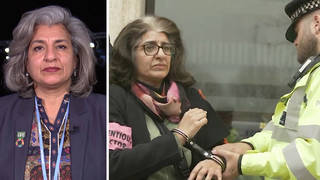
Guests
- Mary Robinsonis president of the Mary Robinson Foundation – Climate Justice. She served as president of Ireland from 1990 to 1997 and U.N. high commissioner for human rights from 1997 to 2002.
Today is International Human Rights Day, which commemorates the day on which the United Nations General Assembly adopted the Universal Declaration of Human Rights in 1948. As we broadcast from the U.N. climate change summit in Paris, France, we look at climate change as a human rights issue. Negotiators have been debating how human rights should be address in the Paris accord. The United States, Norway and Saudi Arabia have been criticized for seeking to eliminate key references to human rights in the text. We are joined by former Irish President Mary Robinson, who is also former U.N. high commissioner for human rights. In 2010, Robinson set up the Mary Robinson Foundation–Climate Justice. “To me, [climate change] is the biggest human rights issue in the world,” Robinson says.
Transcript
AMY GOODMAN: We’re broadcasting from the U.N. climate change summit in Paris, France. It’s COP21. And it’s International Human Rights Day. It commemorates the day on which the United Nations General Assembly adopted the Universal Declaration of Human Rights in 1948. Earlier today, the Nobel Peace Prize was awarded to Tunisia’s National Dialogue Quartet for helping achieve a peaceful transition to democracy in their own country.
Well, today, we begin the show looking at climate change as a human rights issue. Here at the talks, negotiators have been debating how human rights should be addressed in the Paris accord. The United States, Norway and Saudi Arabia have been criticized for seeking to eliminate key references to human rights in the text.
We’re now joined by former Irish President Mary Robinson. She is also the former U.N. high commissioner for human rights. In 2010, she set up the Mary Robinson Foundation–Climate Justice.
President Robinson, welcome back to Democracy Now! It’s great to have you with us.
MARY ROBINSON: Thank you, Amy. And happy International Human Rights Day.
AMY GOODMAN: So talk about how human rights relates to climate change and climate justice.
MARY ROBINSON: Human rights absolutely relate to climate change, because climate change is undermining human rights all over the world and undermining people’s livelihoods, undermining people’s health, forcing people to leave their homes because of drought or flooding—often, actually, also causing them loss of life. It is having a very negative impact. And that’s been recognized by the Human Rights Council. So, even if there was nothing in this agreement—which I hope there will be—about human rights, human rights is there anyway as very, very central to our approach to climate change. To me, it’s the biggest human rights issue in the world.
AMY GOODMAN: So, how did you come to this issue of climate justice? You didn’t really raise it, certainly didn’t make it a centerpiece, when you were the U.N. high commissioner for human rights.
MARY ROBINSON: And I’ve been very open and very modest about that. No, I didn’t. It wasn’t front of my mind, because it was being dealt with in another part of the U.N. and—you know, a little bit of a silo approach. And then I started to work on economic and social rights in Africa. And everywhere I went, people said, “Oh, but things are so much worse.” And I realized they meant the rainy seasons weren’t coming in Liberia the way they used to, and there was long periods of drought and flash flooding in northern Uganda, which my friend Constance Okollet would talk about. But everywhere I went, people saw something that they had never seen before, you know, and there’s a long oral tradition, so that’s more than 200 years, because people pass stories on. And it was so much worse—climate shocks, climate disruption. I saw it in Bangladesh when I went there. And I realized, when I read the science, that we’re running out of time, that actually, as has been said often now during this year, we’re the first generation to fully understand the dangers of climate change and the last generation with time to do something about it. And that time is now here in Paris.













Media Options